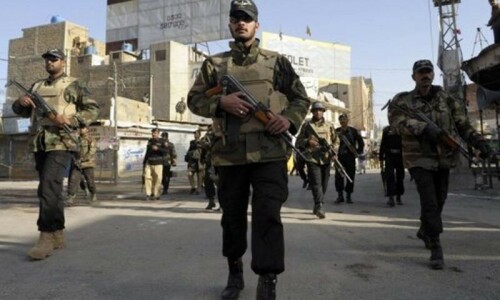PESHAWAR: As Eidul Fitr is just around the corner, more and more in-patients are leaving hospitals in Khyber Pakhtunkhwa to celebrate the post-Ramazan festival with families, insist doctors.
“Normally, our wards overflow with patients, but they’ve got a lot of space ahead of Eid as patients admitted for treatment are going home to join Eid celebrations at home,” a senior physician at a medical teaching institution told Dawn.
He also said most patients requiring surgeries for kidney, gallstone, and tonsillitis didn’t visit doctors in Ramazan due to fasting and postponed medical procedures until after Eidul Fitr.
“This pre-Eid attitude of patients has upset our [hospitals’] routine. Patient arrivals will go up soon after Ramazan is over. However, this will make hospital visitors wait longer for operations,” he said.
Medics insist people avoid visits due to fasting
The physician said hospital staff members usually sat idle in the eye, ENT, and skin outpatient departments as well as in wards in the run up to Eidul Fitr as patients didn’t show up.
Doctors at a district headquarters hospital told Dawn that public sector healthcare centres across the province, including Peshawar, wore a “deserted look” during Ramazan as patients postponed checkups and treatments until after Eid due to fasting.
They said their hospital had 500 beds, but 400 of them were unoccupied in the run up to Eid.
“We think that only 50 beds will have inpatients during Eid days. This happens every year,” a doctor said, adding that patient arrivals will go up tangibly after the post-Ramazan festival is over.
He, however, said the accident and emergency departments functioned as usual because those with critical problems and injuries were brought in for treatment.
“Not only public sector hospitals but the private healthcare centres, too, are facing an acute shortage of patients in Ramazan. We [private hospitals] aren’t getting more patients in the current month of fasting, so we’ll struggle to earn enough to pay for utility bills,” a senior surgeon at a private hospital in Peshawar told Dawn.
He said people having minor health issues or requiring minor surgeries could fast, but they preferred putting off consultations and treatment until after Eid.
“There are only a few minor surgeries that require patients not to fast for a day or two, but most patients don’t want to miss fasting for a single day,” he said.
The surgeon said private hospitals faced problems paying salaries to staff members due to low incomes in Ramazan.
He also said things were no different at privately-owned diagnostic centres, which, too, reported low patient arrivals during the month of fasting.
“The number of lab visitors nose-dives when Eid is just a few days away,” he said.
The surgeon, however, insisted that hospitals in both the public and private sectors received more patients after Eidul Fitr.
“It gets difficult for government hospitals to cope with high patient loads after Eid, and therefore, patients have to wait for longer periods to get treatment, while private hospitals work for additional hours to conduct more and more medical procedures,” he said.
Published in Dawn, April 7th, 2024













































Dear visitor, the comments section is undergoing an overhaul and will return soon.